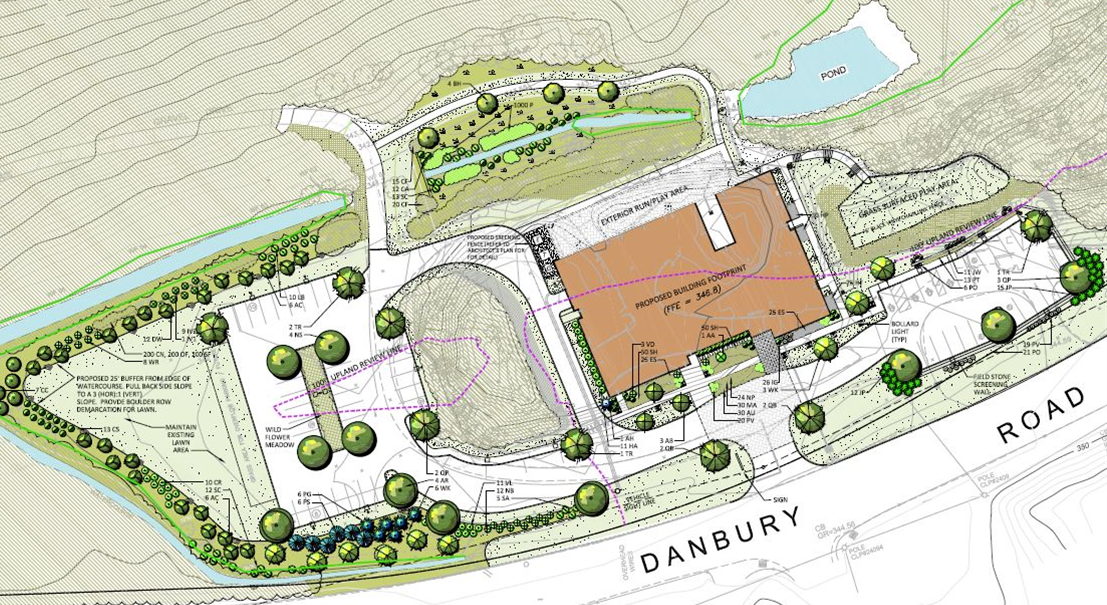Every pet owner wants their animal to be healthy, happy, and living their best lives. Sometimes though, the cost of caring for your beloved pet can be a financial burden. The Connecticut Humane Society’s (CHS) new center on Danbury Road in Wilton aims to address that stress for residents as far as away as Stamford. At nearly 15,000 square feet, the new facility, built on 18 sprawling acres, includes dog-walking space, a “catio” (pretty much exactly what it sounds like), adoption and foster services, education, and more.
A center that offers public low-cost vet services and a free pet food pantry might not seem necessary in what’s generally considered a well-to-do area. But the economic reality of pet care cuts across the income scale, says Barbara Naugle, the CHS director of development. Pet surrenders (when owners voluntarily give up their animals) were already on the rise pre-COVID, then spiked during the pandemic. Disruptive life events—a move, a divorce, a job loss, an illness—can make it difficult for owners to care for their pets. And care costs (routine tests, medications, the occasional kennel stay) are increasing. All the cuddles in the world won’t cover a thousand-dollar vet bill. On top of that, there’s currently a nationwide shortage of veterinarians. It’s incredibly expensive to become a vet, with student loans in the realm of $150,000. The profession itself is also changing, with medical conglomerates buying up small practices and reducing services that require expensive diagnostic tools.
“When we opened our clinic in Newington, it was mainly for people struggling financially or with disabilities, or senior citizens who only had their Social Security income,” Naugle says. “Now we’re seeing a new group coming to the clinic. The cost to keep a pet is huge for every family, those with a professional job, or a hairdresser or a mechanic—people in our community who fill all the gaps and do all the extra jobs. Everybody’s struggling.”
 Enter the CHS. Yes, they take in abandoned or surrendered animals (the organization only handles cats, dogs, rabbits, and other animals that Naugle describes as “a pet that might sit on the couch”). They can help would-be pet owners adopt. But the focus has shifted to keeping a pet with its original family. That is better for all concerned, she says. Last year, 70 percent of the 5,300-plus pets the CHS dealt with were served through what’s called “retention programming.” Low-cost vet services, the free-food pet pantry, pop-up wellness clinics for basic treatments like vaccines and tests, even short-term fostering for households in crisis; all of this is meant to keep owner and pet under the same roof.
Enter the CHS. Yes, they take in abandoned or surrendered animals (the organization only handles cats, dogs, rabbits, and other animals that Naugle describes as “a pet that might sit on the couch”). They can help would-be pet owners adopt. But the focus has shifted to keeping a pet with its original family. That is better for all concerned, she says. Last year, 70 percent of the 5,300-plus pets the CHS dealt with were served through what’s called “retention programming.” Low-cost vet services, the free-food pet pantry, pop-up wellness clinics for basic treatments like vaccines and tests, even short-term fostering for households in crisis; all of this is meant to keep owner and pet under the same roof.
It’s taken over 12 years for this new center to get across the finish line, says Naugle. First, the organization had to determine the best location that could serve areas not already covered by existing centers. Then the real estate search began; all told, the group looked at 48 spaces. In 2020, they found the North Wilton site. With eighteen wooded acres, plenty of outdoor space, and proximity to key roads and highways, it was perfect for their vision. “In 20 years, people will be scratching their heads saying, ‘How did they get this sweet spot?’” says Naugle. The center was thoughtfully built to keep the natural habitat in place as much as possible, including retaining hundred-year-old trees and native wetlands.
For would-be adoptees, there are many ways to connect. People can even consider fostering animals who may not have much time left. “We have people who’ve adopted older pets, and a few volunteers who do hospice foster,” Naugle says. “People in Connecticut have huge,
huge hearts.”
The newly opened Connecticut Humane Society Center is at 863 Danbury Road, Wilton. Go to cthumane.org, or call 800-452-0114 for more information. •